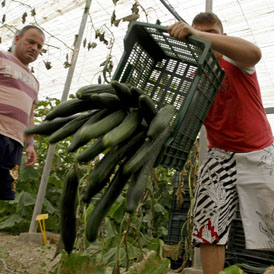365 more E.coli cases reported in Germany
Hundreds more cases of the potentially deadly E.Coli bug have been reported in Germany. Spain threatens to sue as it emerges that cucumbers from the country are not to blame for the outbreak.
<!–
–> <!–
–>

Germany’s Federal Institute for Risk Evaluation admitted later that tests had showed that, while contaminated, the cucumbers did not carry the O104:H4 strain responsible for the deaths.
We do not rule out taking action against authorities which have cast doubt on the quality of our produce. Alfredo Perez Rubalcaba
Spain’s Deputy Prime Minister Alfredo Perez Rubalcaba said: “We do not rule out taking action against authorities which have cast doubt on the quality of our produce, so action may be taken against the authorities, in this case, of Hamburg.”
Spanish farmers say lost sales are costing them 200 million euros a week, and could put 70,000 people out of work in a country with the highest unemployment in the EU.
Germany’s Consumer Protection and Agriculture Minister Ilse Aigner has shrugged off criticism that the government was wrong to point the finger at produce from Spain, saying: “There were E. coli pathogens found on Spanish cucumbers. Therefore, per European regulations, a rapid alert needed to be sent out.”
Several European countries are said to have blocked entry of Spanish cucumbers, but Mr Dalli said the Commission had received no official confirmation of any import bans.
Russia’s consumer protection watchdog repeated a threat to ban all vegetable imports from the EU, after banning raw vegetable imports from Germany and Spain.
A spokesman said: “Despite repeated requests, Russia’s consumer protection watchdog has not received information from the European Union about the source of the infection, about dangerous produce or about measures being taken to localise and combat the outbreak.”
More from Channel 4 News: Germany blames Spain for killer cucumbers
European Union officials said three cases of E.coli infection have also been reported in the United States, adding that most cases reported outside Germany involved German nationals or people who had recently travelled there.
Paul Hunter, a professor of health protection at Britain’s University of East Anglia, said he was not surprised that cucumbers turned out not to be the source of the outbreak.
He said: “Cucumbers are not normally implicated in food poisoning outbreaks. They are so easy to clean for a start, and bacteria are less likely to be able to find a protected spot.
“On the other hand, salads are a regular cause of outbreaks of food-borne diseases including STEC, like this one, and salmonella. Outbreaks associated with consumption of salads are quite common on both sides of the Atlantic.”